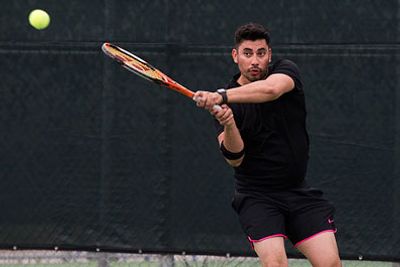By Tony Contini, March 2017 Web Exclusive.
The 2017 Cactus Open, a three-day singles and doubles tournament put on by the Cactus Tennis Alliance (CTA) and the Gay and Lesbian Tennis Alliance (GLTA), took place at the Phoenix Tennis Center Feb. 11-13.
This year marked its largest event to date, with 81 participants traveling from as for as from New York and Indianapolis to San Antonio and Los Angeles. And, as expected, the February weather was wonderful and the visiting participants loved the break from winters at home.
Eric Hunter has played on these courts for more than 10 years. He's on the Cactus Open's planning committee with their sole female member Kellye Pinkleton.
"There's a lot of girls, but not as many females," Hunter joked.
This year the Cactus Open sponsored one•n•ten, a support organization that serves LGBTQ youth and young adults ages 14-24.
"You can't go wrong," Pinkleton said. "You're seeing friends and family, you're playing tennis, you're travelling and you're supporting a charity."
Tennis can be an exciting and vocal game. Some players grunt while exhaling to relax their tensions, others become vocal to air frustrations during intense matches. The athletes enjoyed themselves, but every match was cutthroat.
"Everybody comes out to have fun, but it's fun because it's competitive," Hunter said, adding that anyone who wants to play can, and no one is pushed out if they're not as spirited. The devoted amateurs play alongside semi-pros and former college players.
All players are driven by the love of tennis and the challenge. But it's community that levels the playing field and passion and kindness that set this group apart.
During one match a player said "great serve" to his opponent. The server responded, "It's a good thing, because I had so much sweat in my eyes I couldn't have returned yours." Rarely was there a fantastic play that wasn't followed by the other saying "good job."
The Game Plan
While fatigued and cramping after making the finals, Andy Chan said the further you go through the competition, it's less about your tennis skill, and more about your mentality, endurance and physical ability. He went through four singles matches before reaching the finals.
Chan, whose background is in badminton, broke his ankle and vowed to never play the game again after breaking his ankle. He has since switched to tennis and has been playing in LGBTQ tennis tournaments in San Diego.
He has also started utilizing a two-handed racket for a double-handed forehand and backhand, which draws instant attention on the courts.
Chan said the level he plays on, the C group, included players with a a variety of skill sets and experience.
The main goal is figuring out your opponent, he summarized. Some players simply try to hit the ball as hard as they can, others won't bend down to save a return. You can use their playing style to your advantage.
Chan said he's seen many frustrated players. The question is "can you hang with it?" Chan said.
The tournament racketed a high energy environment where all levels of player could learn, better themselves and attempt to hang with the pressure.
Love Tennis, Will Travel
The GLTA fuels the fire of intrigue to travel to other tournaments by offering entry as raffle prizes at post-game events.
Albert Anaya from San Antonio said the Cactus Open was much more organized than other tennis competitions. He and Arturo Samaniego discovered this event after a friend won entry in a raffle.
Anaya and Samaniego said they loved the atmosphere and how smooth the tournament ran. Even with a rain delay, everyone was notified immediately. But most of their enthusiasm was focused on tennis and meeting people from different cities.
"I love playing tennis," Samaniego said. "I'd follow tennis anywhere."
For more information on the Cactus Tennis Alliance, find them on Facebook at facebook.com/cactustennis. Additionally, the CTA hosts We have two nights of open play each week: 7-9 p.m. on Fridays and 5-7 p.m. on Sundays at the Phoenix Tennis Center, 6330 N. 21st Ave., in Phoenix (cost is $8 per player.)
